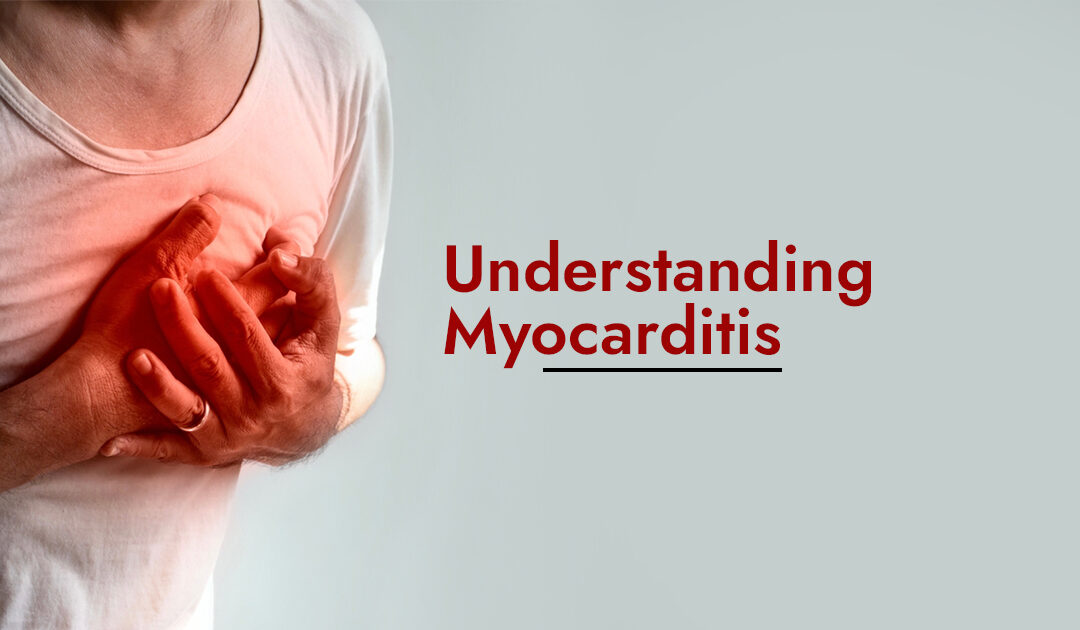Myocarditis is an inflammation of the heart muscle. This can weaken your heart muscle and make it more difficult for it to pump blood. Myocarditis differs from other types of inflammation in that it affects a particular region of your heart. Some uncommon kinds of myocarditis are:
- Lymphocytic myocarditis.
- Giant cell myocarditis.
- Fulminant myocarditis.
- Eosinophilic myocarditis.
Researchers estimate that approximately 1.5 million instances of myocarditis occur worldwide each year. This translates to 10 to 20 people affected for every 100,000 people.
Some Symptoms of Myocarditis include:
Early myocarditis may not cause symptoms. Others experience just minimal symptoms. The following are common myocarditis symptoms:
- Chest pain.
- Fatigue.
- Leg, ankle, and foot swelling.
- Arrhythmias (heartbeats that are rapid or irregular).
- Shortness of breath at rest or while active.
- Lightheadedness or the sensation that you are about to faint.
- Symptoms similar to the flu include headaches, body pains, joint discomfort, fever, and a sore throat.
Myocarditis symptoms can be similar to those of a heart attack. If you’re experiencing inexplicable chest pain and shortness of breath, get emergency medical attention.
When children develop myocarditis, symptoms may include:
- Difficulty breathing.
- Rapid breathing.
- Chest discomfort.
- Arrhythmias (rapid or irregular heartbeats).
- Fainting.
- Fever.
What causes Myocarditis?
Myocarditis is often caused by an unknown factor. A viral infection is usually the root reason. These include the following:
- Flu.
- Herpes Virus 6.
- Adenovirus.
- Coxsackie virus.
- The Parvovirus B19.
- SARS-CoV-2 (covid-19).
- Bacteria.
- Fungi (rarely).
- Chagas disease.
- Rheumatic fever.
- Autoimmune disorders such as rheumatoid arthritis and lupus.
- Radiation and heavy metals are two examples of things to which you are exposed that might cause Myocarditis.
Some medications can have side effects that cause Myocarditis. Some of these include:
- Cardiology medications.
- Antidepressants.
- Seizure medications.
- Antibiotics.
- Medication for weight loss.
- Diuretics.
- Benzodiazepines.
- Medicines for psychiatric disorders.
Who is at risk for developing Myocarditis?
Some of the factors that increase your chance of developing myocarditis are unchangeable. Myocarditis is more likely to occur if you:
- You’re in your early twenties. People of various ages can acquire it, though.
- You were born a guy or assigned male (AMAB).
- It also occurs to women and those who have been assigned female at birth.
- Inflammation adversely affects your body.
- Genes that influence how your body deals with inflammation and how likely you are to get it.
- You consume more alcohol than your healthcare provider allows.
Some medical problems and treatments also increase your risk of acquiring Myocarditis. They are as follows:
The medical problems are:
- Diabetes.
- HIV/AIDS.
- Skin injuries or infections.
- Cancer treated with certain medicines.
- Eating disorders.
- End-stage kidney disease.
- A chest injury.
The medical treatments are:
- Dialysis.
- Implanted heart devices.
- Radiation.
- Treatments for heart problems.
- Having a central venous line.
Some complications of Myocarditis are:
- Cardiomyopathy.
- Lung issues.
- Arrhythmia.
- Fainting.
- Heart failure.
- Cardiogenic shock.
- Sudden cardiac death.
Myocarditis is diagnosed using tests, physical exams and medical histories. If your case is minor, it may resolve on its own. If not, your healthcare professional can order medications for you.
In conclusion, myocarditis is a heart muscle inflammation that can have a severe influence on pumping performance. While the reason is not always evident, viral infections are a common culprit. Early indicators may be mild, but frequent symptoms include chest discomfort, shortness of breath, and exhaustion. If you suffer any of these symptoms, especially if you have just contracted a viral disease, seek medical assistance immediately. Myocarditis can afflict persons of any age, however young men appear to be at a somewhat higher risk. While some cases resolve on their own, others necessitate medicine to control inflammation and preserve cardiac function. Early diagnosis and treatment are critical for avoiding major problems such as cardiac failure or arrhythmias. If you are concerned about myocarditis, consult your doctor to learn more about your specific risk factors and how to preserve your heart health.

